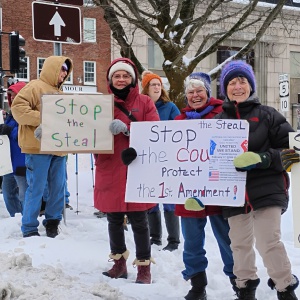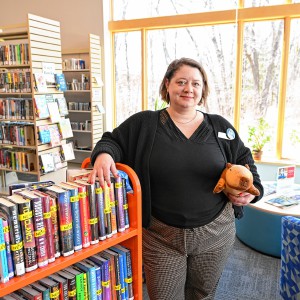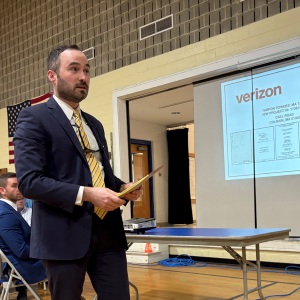Webinar seeks to debunk myths about affordable housing

Downtown Greenfield. STAFF FILE PHOTO/PAUL FRANZ
| Published: 06-27-2024 5:58 PM |
When talking about affordable housing, as with anything, it is important to separate fact from fiction.
It was with this in mind that the Franklin Regional Council of Governments partnered with the Boston-based Citizens’ Housing and Planning Association (CHAPA) to hold an online workshop this week to try to debunk myths that persist on the topic.
Meghan Rhodes, housing and livability program manager at FRCOG, emceed the webinar on Wednesday while Monica Keel, municipal engagement program associate at CHAPA, discussed common misconceptions and provided information about the need for more housing in this area.
“I think we’ve got a lot of work to do in the next couple of years,” Rhodes said. “Clearly, housing and affordable housing is an issue in the region.”
Keel explained some common housing myths include the misconception that affordable and multi-family housing will be a net drain on a municipality’s fiscal resources. In reality, she said, a study from the Joint Center for Housing Studies at Harvard University found that higher-density developments like townhouses and apartments in redeveloped buildings are more fiscally prudent than traditional suburban sprawl — low-density, single-family homes. Keel said the study found that apartment developments generally pay higher taxes than single-family homes, and are categorized as commercial real estate. Also, infrastructure and services such as electric, sewer and policing are better offered in a densely populated community.
Another myth, she said, is that Franklin County has enough residents and no reason to attract more. Keel explained that a growing population has economic benefits, including a greater tax base, support for local businesses and a larger employment base for local employers. Downtown businesses need a density of people to thrive. Also, declining school enrollments equal increased costs per student and an unsustainable spiral of reduced offerings, which further decrease enrollments.
“Everybody needs and deserves housing that is affordable to them,” Keel said.
Yet another myth that persists is that this area needs more businesses, not housing. Keel mentioned there is an undeniable need for more local businesses, but it is vital to ensure that the people who work for those companies have affordable places to live. Affordable housing gives employers access to a reliable workforce, she added, which is critical to financial success.
Article continues after...
Yesterday's Most Read Articles
 Local ‘Hands Off!’ standouts planned as part of national effort
Local ‘Hands Off!’ standouts planned as part of national effort
 Shelburne Selectboard determines police detective will retain job
Shelburne Selectboard determines police detective will retain job
 Local libraries react to state funding cuts, federal administrative leave
Local libraries react to state funding cuts, federal administrative leave
 Incandescent Brewing now open in Bernardston
Incandescent Brewing now open in Bernardston
 Cooking up an expansion: Cocina Lupita eyes second location in Turners Falls
Cooking up an expansion: Cocina Lupita eyes second location in Turners Falls
 ‘She is our future’: Thirty years after permitting women to join, Montague Elks is almost entirely women-led
‘She is our future’: Thirty years after permitting women to join, Montague Elks is almost entirely women-led
Keel, a self-professed “housing nerd,” cited U.S. Census Bureau information that lists Franklin County’s population at 70,980. There are 33,000 year-round housing units, with two-thirds of these being single-family dwellings. Statistics show 30% are renter-occupied, with two-thirds of those in Greenfield, Montague and Sunderland. Keel mentioned Franklin County’s population has declined slightly since 2000 and is predicted to continue to drop. Rhodes mentioned a lot of Franklin County residents want to remain in the county but cannot because there is not enough housing.
Keel also said home sale prices are not in line with current salaries of Franklin County residents. The median single-family sale price here is reportedly $315,000 and the median household income is $70,383. Meanwhile, the necessary family income to not be cost-burdened is $105,722. Keel explained cost-burdened means 30% or more of someone’s income goes toward housing costs, such as rent and utilities.
“It is our job as a commonwealth to take care of this problem together,” she said.
Wednesday’s workshop was organized by FRCOG’s Community Health Improvement Plan (CHIP) network. A CHIP is a three- to five-year plan to bring together resources that addresses the root causes of health issues by making lasting changes to environments, policies and systems. This network’s priorities through 2028 include expanding access to health care (including mental health care); increasing access to affordable vehicles, driving education and licenses; and reducing childhood trauma through regional policy and systems change.
During time for public comment, Orange plumber Casey Bashaw said his job puts him in residences throughout the county, and he sees more and more people moving here because it is quiet and affordable. He said these people come from other Massachusetts counties, as well as Connecticut and New York.
“Many of them now work from home,” Bashaw said. “That’s now a big piece of what’s going on.”
He mentioned he recently repaired the mini splits of a retired woman who moved to Orange from Fitchburg, about 45 minutes away, for the cheaper cost of living.
Jessye Deane, executive director of the Franklin County Chamber of Commerce, chimed in to say higher wages and diversified industry are needed in this area.
“And that’s kind of part of the challenge,” she said.
Reach Domenic Poli at: dpoli@recorder.com or 413-930-4120.






 New panel to review senior housing proposals in Deerfield
New panel to review senior housing proposals in Deerfield Shutesbury reviewing how to improve safety on Lake Wyola in wake of accident last summer
Shutesbury reviewing how to improve safety on Lake Wyola in wake of accident last summer Colrain zoning board approves variance for Call Road cell tower
Colrain zoning board approves variance for Call Road cell tower
